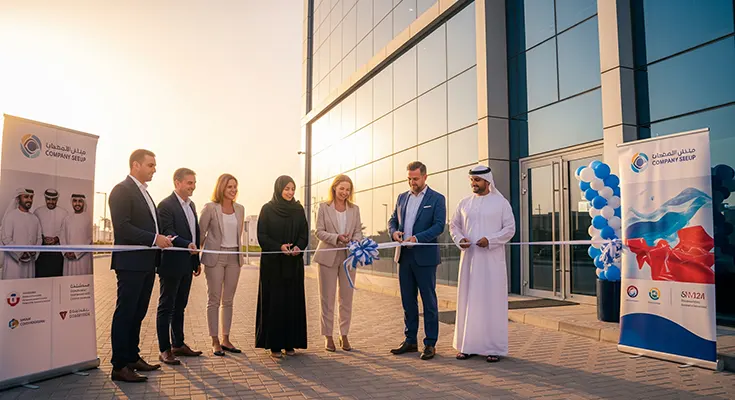Key Takeaways:
- The first step is to define your business activity and choose the appropriate legal structure and jurisdiction (mainland or free zone).
- Secure trade name approval and gather all necessary personal and company documentation.
- Obtain an Initial Approval from the relevant authority, signaling their acceptance of your business proposal.
- Draft and notarize the Memorandum of Association (MOA) or Local Service Agent (LSA) agreement, if required by your chosen legal form.
- Lease a physical office space (mandatory for most setups) and obtain your trade license.
- Complete post-licensing requirements, including corporate bank account opening and visa processing.
Dubai has long been a beacon for entrepreneurs and investors globally, thanks to its strategic location, tax advantages, and supportive business environment. However, the process of a Business setup in Dubai involves several distinct steps, each requiring careful attention to detail and adherence to local regulations. While the process is streamlined, understanding each stage is crucial for a smooth and efficient company formation. This article outlines the essential steps to opening a company in this thriving emirate.
Defining Your Business and Choosing the Right Path for Business setup in Dubai
Before you begin any formal application, the initial phase of a Business setup in Dubai requires clear strategic decisions about your business model and operational framework.
- Determine Your Business Activity: This is the foundational step. The UAE’s Department of Economy and Tourism (DET) and various Free Zone authorities categorize thousands of business activities, each requiring a specific license type (e.g., commercial, professional, industrial). You must precisely define what your business will do. This will determine the license type, any additional approvals needed from other government ministries (e.g., healthcare, education, media), and ultimately, the best jurisdiction for your setup.
- Select Your Legal Structure: Your chosen business activity and ownership structure will dictate the legal form of your company. Common structures include:
- Limited Liability Company (LLC): The most popular choice for mainland businesses, now allowing 100% foreign ownership for most activities.
- Sole Establishment/Proprietorship: For individual entrepreneurs, with unlimited liability.
- Civil Company: For specific professional services where partners hold individual professional licenses.
- Free Zone Establishment (FZE) / Free Zone Company (FZ-LLC): These structures are specific to free zones and offer 100% foreign ownership and full profit repatriation.
- Branch Office/Representative Office: For established foreign companies wishing to have a presence in Dubai.
- Choose Your Jurisdiction (Mainland vs. Free Zone): This is a critical decision that impacts your operational scope and benefits:
- Mainland Company: Registered with the DET, a mainland company can trade directly with the local UAE market and internationally. It offers greater flexibility in terms of location within Dubai. Recent changes in law allow for 100% foreign ownership for most mainland activities.
- Free Zone Company: Located within one of Dubai’s numerous Free Zones (e.g., Meydan Free Zone in Dubai), these companies offer 100% foreign ownership, 0% corporate tax on qualifying income, and full repatriation of profits. However, they are generally restricted from direct trading with the UAE mainland market without appointing a local agent or setting up a mainland distributor. Free zones are ideal for businesses with an international focus.
These initial decisions form the blueprint for your entire Business setup in Dubai.
Securing Approvals and Trade Name for Business setup in Dubai
Once your fundamental business aspects are defined, the next steps in your Business setup in Dubai involve gaining initial governmental approvals and reserving your company’s identity.
- Trade Name Reservation: You must submit a proposed trade name for your company to the relevant licensing authority (DET or Free Zone authority). The name must be unique, not violate public morals or order, and sometimes include an abbreviation of the legal form (e.g., LLC). Once approved, the trade name is reserved, usually for a limited period.
- Initial Approval: This is a crucial “no objection” certificate from the licensing authority, signifying their acceptance of your proposed business activity and legal structure. This approval is necessary before you can proceed with drafting legal agreements or leasing office space. It confirms that your business concept aligns with the UAE’s regulations.
- Drafting Legal Agreements:
- Memorandum of Association (MOA): For an LLC and some other corporate structures, an MOA is a mandatory public document outlining the company’s name, purpose, share capital, and the rights and responsibilities of its shareholders. This document must be drafted and usually notarized by a UAE Public Notary.
- Local Service Agent (LSA) Agreement: For sole establishments or civil companies fully owned by expatriates on the mainland, an LSA agreement is required. A Local Service Agent (a UAE national) acts as a representative for administrative purposes but has no ownership in the business.
- Gathering Shareholder and Manager Documents: You will need to provide clear passport copies of all shareholders, directors, and the appointed manager. For UAE residents, valid Emirates ID and visa copies are also required. Depending on the authority, proof of residential address and a No Objection Certificate (NOC) from a current employer (if applicable) might be needed.
These steps lay the legal groundwork and establish the official identity for your Business setup in Dubai.
Obtaining Your License and Office Space for Business setup in Dubai
With initial approvals and legal documentation in hand, the next critical phase for a Business setup in Dubai is securing your operational base and the official permit to trade.
- Leasing Office Space / Ejari Registration: All businesses in Dubai are required to have a physical address. The type of office space required varies by jurisdiction and business activity:
- Mainland Companies: Generally require a physical office space, the tenancy contract for which must be registered with Ejari, the official system of the Dubai Land Department.
- Free Zone Companies: Often have more flexible options, including shared desks (flexi-desks), co-working spaces, or virtual office solutions provided by the Free Zone authority. For example, Meydan Free Zone in Dubai offers a range of flexible office solutions.
- Final Submission and License Issuance: Once the office space is secured and all necessary legal agreements (like the MOA) are executed, the complete application package is submitted to the relevant licensing authority. This includes all approvals, legal documents, and passport copies. Upon successful review and payment of all government fees, your trade license will be issued. This is the official document that permits your business to legally operate in Dubai, specifying your business activities and validity period.
- Obtaining Other Permits (If Applicable): Depending on your specific business activity, you might require additional permits or approvals from other regulatory bodies, such as the Dubai Municipality, Dubai Health Authority (DHA), or Telecommunications Regulatory Authority (TRA). Your business setup consultant can help identify and obtain these.
At the completion of this stage, your Business setup in Dubai is legally recognized and ready to commence operations.
Post-Licensing Formalities and Compliance for Business setup in Dubai
The process of a Business setup in Dubai extends beyond merely obtaining a trade license. Several vital post-licensing formalities and ongoing compliance measures are essential for smooth and legitimate operation.
- Corporate Bank Account Opening: Once your trade license is issued, opening a corporate bank account is paramount for managing your business finances. This process can be stringent due to international anti-money laundering (AML) and Know Your Customer (KYC) regulations. You will typically need your company’s trade license, MOA, shareholder/director passport copies, and a clear business plan. Many setup consultants can facilitate introductions and guide you through this process.
- Residency Visa Processing: For foreign investors and any expatriate employees, obtaining residency visas is a crucial next step.
- Investor Visa: As a business owner, you will apply for an Investor Visa (Partner Visa), typically valid for 2 or 3 years. This involves obtaining an Establishment Card for your company, applying for an entry permit, undergoing a mandatory medical fitness test, applying for an Emirates ID, and finally, getting the visa stamped in your passport (or receiving digital confirmation).
- Employment Visas: For employees, your company will need to register with the Ministry of Human Resources and Emiratisation (MOHRE) and apply for work permits and employment visas.
- Tax Registration and Compliance:
- VAT Registration: If your annual taxable supplies exceed AED 375,000, your business must register for Value Added Tax (VAT) with the Federal Tax Authority (FTA).
- Corporate Tax Registration: With the introduction of Corporate Tax in the UAE for financial years starting on or after June 1, 2023, all taxable businesses, including free zone companies, must register with the FTA and file annual tax returns. While some free zone companies may qualify for a 0% Corporate Tax rate on specific “qualifying income,” registration and filing remain mandatory.
- Ultimate Beneficial Owner (UBO) Declaration: All companies must identify and declare their Ultimate Beneficial Owners to the relevant licensing authority and keep this information updated.
- Annual Renewals and Ongoing Compliance: Your trade license and associated permits, as well as employee visas, require annual renewal. Staying compliant with labor laws, immigration regulations, and tax filings is an ongoing requirement for a sustainable Business setup in Dubai.
Adhering to these post-licensing steps ensures your Business setup in Dubai is not only launched successfully but also operates legally and sustainably.
How Can Meydan Free Zone Help?
For individuals looking into How to open a company for business setup in Dubai?, Meydan Free Zone in Dubai stands out as a highly efficient and supportive platform. Meydan Free Zone in Dubai simplifies the entire process by offering a streamlined, digital application system that covers many of the required steps.
They provide assistance with selecting the right business activity and legal structure tailored to your needs within their free zone, followed by quick trade name approval. Their integrated services facilitate the drafting of necessary legal documents and ensure prompt issuance of your trade license. Meydan Free Zone in Dubai also offers flexible office solutions to meet the physical presence requirement, from virtual offices to dedicated spaces. Crucially, they provide direct support for corporate bank account opening and streamline the entire investor and employee visa process, including establishment card application, medical tests, and Emirates ID processing. By centralizing these critical services, Meydan Free Zone in Dubai significantly reduces complexity and time, making your Business setup in Dubai journey remarkably smooth.


